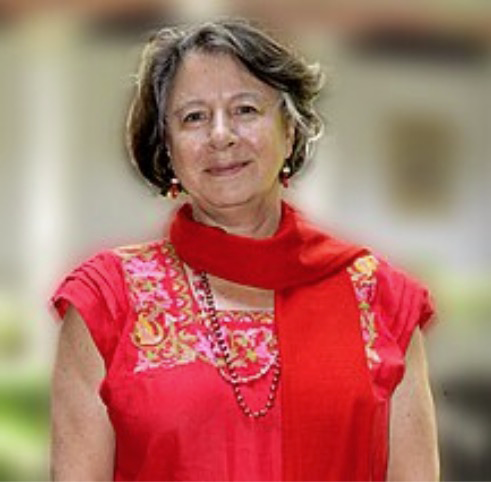Gallery Talk by Marta Turok
Saturday, July 20, 2024, 1:30pm
“Mirrors of the Soul: Textiles and Identity in Frida Kahlo”
“Espejo del Alma: Textiles e Identidad en Frida Kahlo”
Marta Turok will discuss and share images of Frida Kahlo’s dresses and textiles discovered in 2004 at La Casa Azul.
Marta Turok, visiting scholar, anthropologist, and curator, shares her revelatory experiences related to the examination of the contents of a trunk—locked for half-a-century—that belonged to acclaimed artist Frida Kahlo. It had been shut away by her husband and painter/muralist Diego Rivera at La Casa Azul (The Blue House on the outskirts of Mexico City), Frida’s birthplace, the home where she lived with Rivera, her studio, and where she died.
Finally, in 2004, 50 years after her death, the locked room was opened to reveal incredible—often intimate—treasures, frozen in time: some 6,000 photographs, 12,000 documents, and 300 objects—jewelry, make-up, letters, linens, medicines, painkillers. All told, the massive collection provides an incomparable insight into Frida’s identity.
Four years were required for historians to catalogue it all. With her particular area of scholarship and expertise in textiles from Oaxaca, Ms. Turok’s role in the cataloguing process was to identify and document Frida’s dresses and indigenous fabrics. She will relate the amazing story of those riches—she calls them “mirrors of the soul”—at our Gallery Talk on July 20.
Her presentation will show images of Frida’s unique textiles, Tehuana dresses replete with cultural significance, embroidered huipiles (the characteristic square-cut blouses she wore), enaguas (long slip or petticoat rebozos (fringed shawls), and holánes (ruffles or lace flounces).
Some of these objects and images are part of the Casa Azul exhibition on view at the Museo Latino through August 10, 2024.

Marta Turok (b. 1952, Mexico City, Mexico)
Ms. Turok’s career has encompassed the promotion of the cultural value of handcrafts and folk art; teaching traditional Mexican textile design; establishing the Mexican Sport Confederation that supports the preservation of pre-Hispanic sports and games; and developing a project to preserve weaving and sewing traditions in numerous indigenous communities. She is the author of numerous scholarly books and articles and has been the curator of many exhibits in the massive Ruth D. Lechuga folk art collection at the Franz Mayer Museum in Mexico City.
